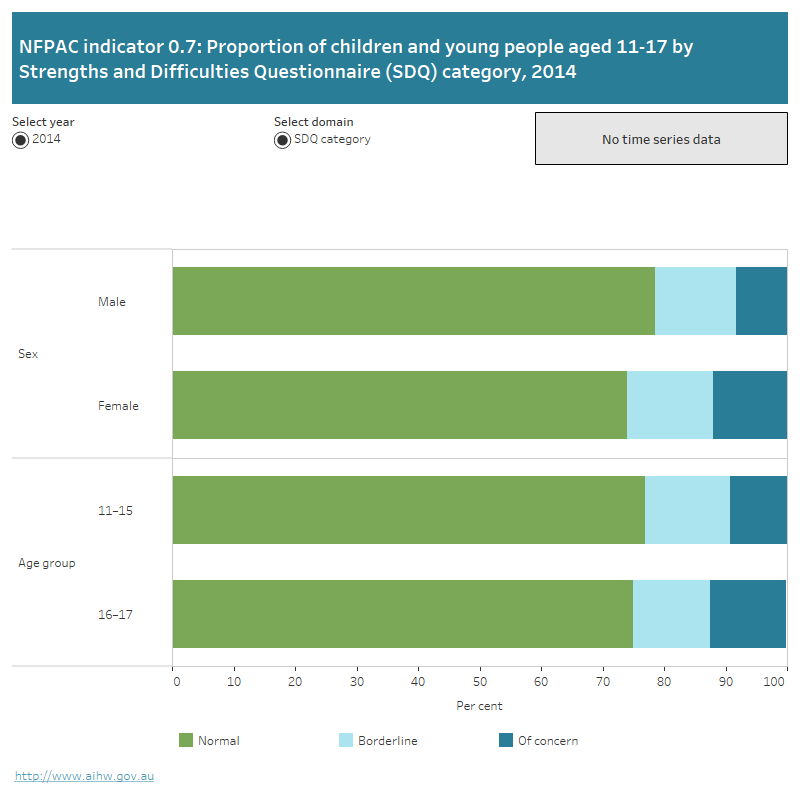0.7 Child Social & emotional wellbeing
Children with poor mental wellbeing experience a range of physical and social impairments, and may be exposed to stigma and discrimination.
The Strengths and Difficulties Questionnaire (SDQ) was one of the modules included in the Australian Child and Adolescent Survey of Mental Health and Wellbeing. The SDQ measures children's social and emotional wellbeing. Results from the SDQ are grouped into three categories: normal, borderline and of concern. Scores in the 'of concern' category indicate substantial risk of clinically significant problems.
Trend data: For all indicator displays, the yearly trend is limited to indicators with 3 or more years (including the current year) of comparable time series data. To see the trend click on “Yearly Trend” button on the display. Where 3 or more years of comparable data including the most recent year is not available, a “No time series data” message is shown on the display.
The horizontal bar graph shows the proportion of children and young people aged 11–17 by their Strengths and Difficulties Questionnaire (SDQ) category (normal, borderline or of concern), sex and age group (11 to 15 and 16 to 17) in 2014.

Source: Lawrence et al. (2015) The mental health of children and adolescents: Report on the second Australian Child and Adolescent Survey of Mental Health and Wellbeing, Department of Health, Australian Government.
See the supplementary data tables for further information and footnotes about these data.
Indicator technical specifications
The information below provides technical specifications for the summary indicator data presented in the quick reference guide.
| Definition | Data source | |
|---|---|---|
| Numerator | Number of children aged 11–17 years who self-completed the Strengths and Difficulties Questionnaire, and their total difficulties score was classified as 'of-concern' | Australian Child and Adolescent Survey of Mental Health and Wellbeing |
| Denominator | Number of children aged 11–17 years who self-completed the Strengths and Difficulties Questionnaire | Australian Child and Adolescent Survey of Mental Health and Wellbeing |
Explanatory notes
The Strengths and Difficulties Questionnaire (SDQ) was one of the modules included in the Australian Child and Adolescent Survey of Mental Health and Wellbeing.
The SDQ is a brief behavioural screening questionnaire comprising five subscales of five items each. Items in four of these subscales (emotional problems, conduct problems, hyperactivity and peer problems) are combined to generate a total difficulties score. The total difficulties score can then be classified into three categories: normal, borderline, and of concern (also referred to as 'abnormal'). Scores in the 'of-concern' range indicate substantial risk of clinically significant problems.
The SDQ was designed so that approximately 10% of children all fall into the 'of-concern' range on the total difficulties score, based on the original normative British population.
This indicator reflects the results from the self-completed version of the SDQ for 11-17 year olds.


